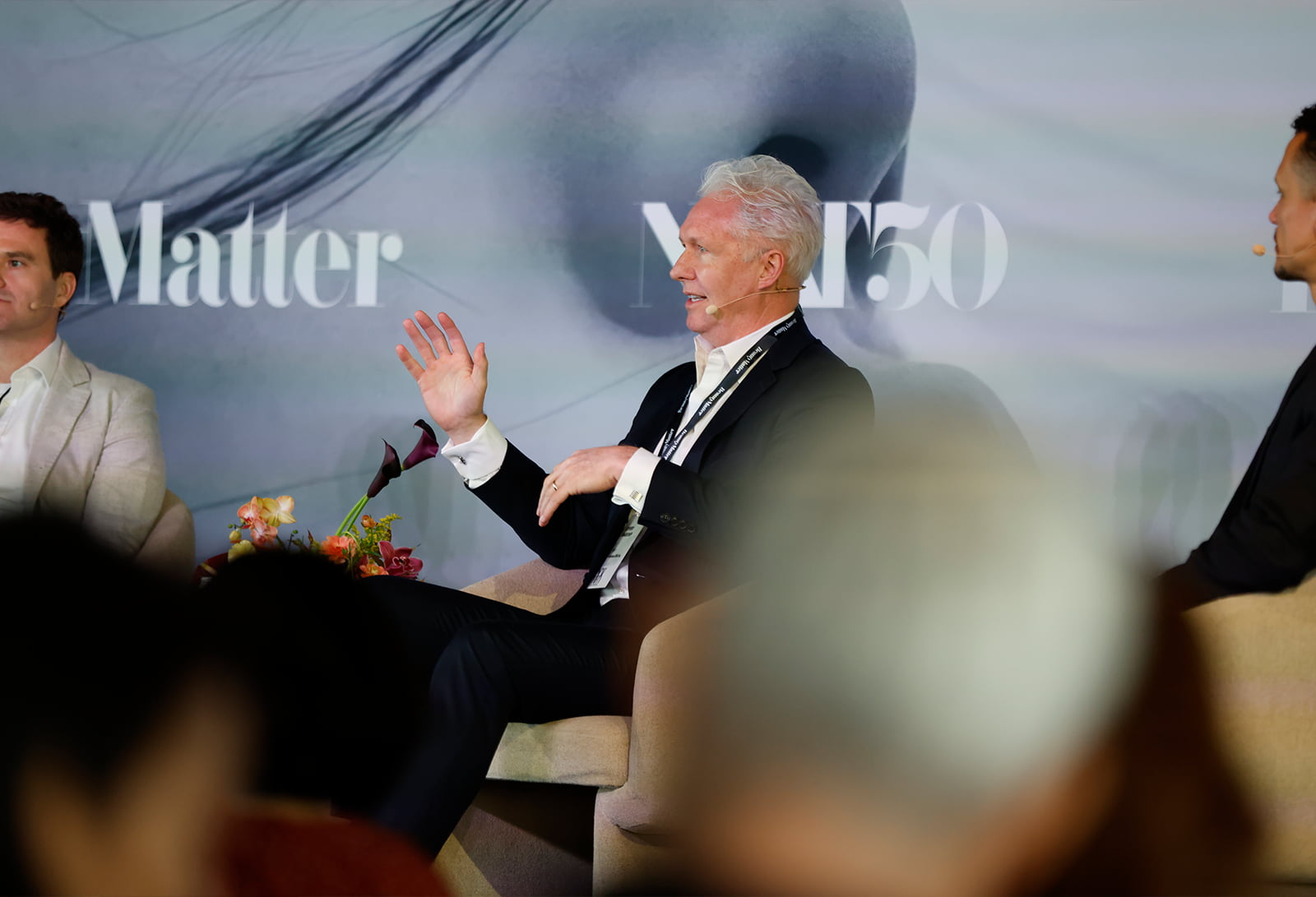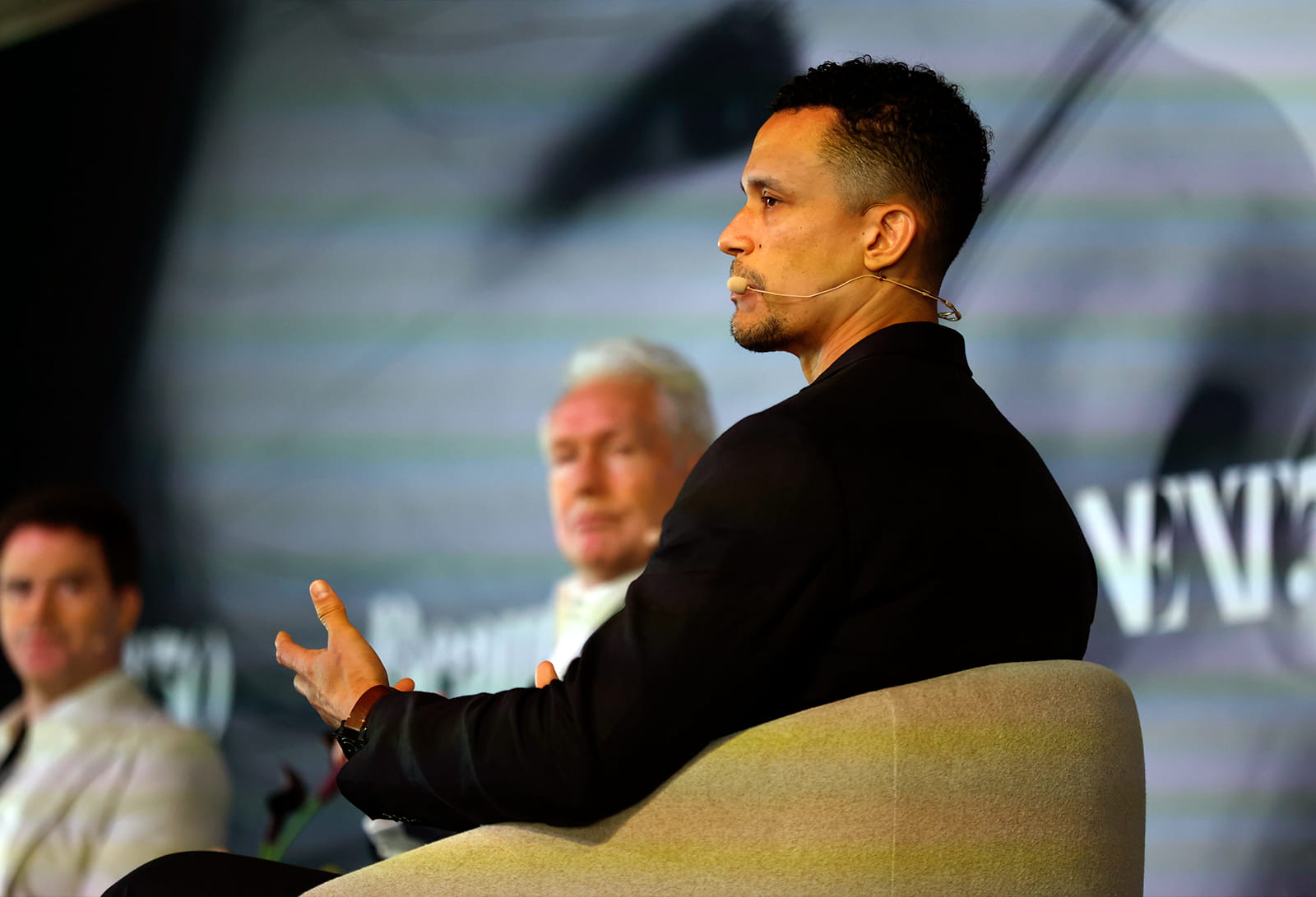Key Takeaways:
In today’s rapidly growing virtual world, the question is no longer whether to use AI, but how to use AI. This was a central theme at BeautyMatter’s NEXT50 Summit in LA, particularly during "AI Is Everywhere: Turning Buzz into Business in Beauty,” a panel moderated by John Cafarelli, co-founder and President of BeautyMatter.
Cafarelli grouped together Jeffery Wagstaff, CEO of CōsNova USA; Frank Freeman, VP of AI and Digital Disruption at Dermalogica and Unilever Prestige; and Chaz Giles, Managing Partner of Alida Labs.
The conversation moved quickly beyond hype and headlines, digging into the messy middle of AI adoption, the trenches where AI’s real business impact is starting to take shape.
Buzzword to Business Tool
For Wagstaff, who oversees a mass beauty brand with hundreds of SKUs, AI isn’t a novelty; it's a necessity. “We really see AI to be a part of a partnership, a member of our team that allows us to increase our productivity and agility,” he said.
AI is already proving its worth in forecasting and inventory management, areas where the right algorithm can mean millions in saved costs. But Wagstaff is clear that the real opportunity isn’t just in automation; it's in reallocation. “AI helps us to do mundane tasks, like analyzing large quantities of data, so our teams can focus on thinking, strategy, and creativity.”
Problems, Culture, and Infrastructure
At Dermalogica and Unilever Prestige, Freeman takes a methodical approach to innovation. His framework for AI adoption revolves around three deceptively simple questions: Are we tackling the right problems? Do we have the right culture? Do we have the right infrastructure?
“Cost savings and efficiencies are exciting,” Freeman noted, “but what excites me even more is sales growth.”
Culture, he added, is as critical as code. “It’s both top-down leadership and bottom-up innovation.” That duality is embodied in Unilever Prestige’s decision to “switch off human translations,” a bold move that forced teams to develop an OpenAI-based system that's now scalable across brands and markets. “We said we're switching off human translations, go figure it out,” he recalled, “and the team did.”
Freeman’s other innovation mantra, “survey, allocate, pioneer, scale,” empowers teams to identify pain points and pilot solutions. “We ask, what’s something you wish you could delegate to an intern? That’s where we start.”
Govern Before Greatness
A commonly shared concern panel-wide was governance. Data sensitivity, privacy, and security loom large over every conversation about AI in beauty. “We’ve set the foundation with a governance framework,” Wagstaff said. “We use AI ethically, effectively, and carefully from a consumer point of view.”
Freeman described the balancing act between innovation and compliance, particularly under General Data Protection Regulation (GDPR) in the European Union. “Many organizations are being risk-adverse, and for good reason. But a lot of enterprises feel like their hands are tied; they’re in what I call [Microsoft] Copilot purgatory, where you’re only allowed to use Copilot, but Copilot doesn’t work.”
To avoid paralysis, Unilever Prestige drafted clean GenAI guardrails. “We’re specific about what you can’t do,” explained Freeman, “but if you’ve got a use case, reach out and we'll find a way to make it happen.”
The Myth of AI Magic
While Wagstaff and Freeman spoke from inside corporate systems, Chaz Giles zoomed out to examine the deeper infrastructure behind successful AI integration. His message was clear: There’s no AI magic without groundwork. “Almost every problem we’ve seen in AI is either data or humans; it's rarely AI itself.”
Giles described AI as a tool that exposes weak systems more than it fixes them. “If your data is messy, AI will make the mess faster. If your workflows are broken, AI will just break them faster.” That’s why his first question to any brand exploring AI isn’t about technology; it's about people and how they understand the technology.
Giles also cautioned against brands trying to build proprietary models. “No one in this room should be building their own AI models,” he said flatly. “You’re better off buying off-the-shelf tech and customizing it for your use case.”
He compared AI adoption to electricity in the early 20th century. “At first, companies hired electricity managers, but eventually electricity just became part of how the business was done. AI is the same; it's not a separate strategy, it's the strategy.”


Avoid the “Big Bang”: Test, Learn, and Democratize
Wagstaff emphasized that incremental adoption beats sweeping overhauls. “We don’t want three or four super users in our company using AI to the maximum while everyone else is just looking for hotels on ChatGPT,” he joked.
Both he and Freeman agreed that the best way to build organizational confidence is to democratize access, invite curiosity, train broadly, and celebrate small wins.
“It’s not about replacing people, " Freeman said. “It’s about freeing them up to do what humans can do—ideate, emphasize, and create.”
Startups vs. Giants: Speed Meets Scale
The conversation turned to whether AI favors start-ups or legacy players. Freeman didn’t hesitate. “There’s never been a more exciting time to launch a brand. If you’ve got the curiosity to try, fail, and learn fast, go for it.”
Start-ups have agility, conglomerates have data and reach. The winning formula, all agreed, will be hybrid, speed powered by scale. “Start-ups have the speed, incumbents have the data,” Giles said. “The winners will be those who marry both.”
The Future: Agentic Commerce and Intelligent Formulation
Looking ahead, Giles outlined what he sees as the next frontier for AI in beauty, what he calls “agentic commerce.”
“Agentic commerce is when your digital agent makes decisions for you, when your AI shopper knows your preferences better than you do,” he explained. “That’s going to turn the retail landscape upside down, the same way e-commerce and SEO once did."
He also predicted a revolution in formulation and supply chain efficiency. “If you can shorten product development from 18 months to three, that’s a revolution,” he said. “AI will drive a whole new pace of innovation.” But his most grounded advice to brands was strategic, not technical. “Focus AI where your brand already has superpowers,” Giles said. “If your edge is community, amplify that. If it’s innovation, double down. The rest will be table stakes.”
The Human Touch Remains
Despite the optimism, Wagstaff offered a reality check. “Don’t trust AI blindly,” he warned. “It takes the human touch. Brand integrity and consumer connection still come from people.”
As the session closed, Cafarelli reflected on what made the discussion so energizing. AI isn’t replacing creativity, it’s redefining how creativity scales. “The real winners won’t be the ones who adopt AI first,” he said, “but the ones who integrate it best.”